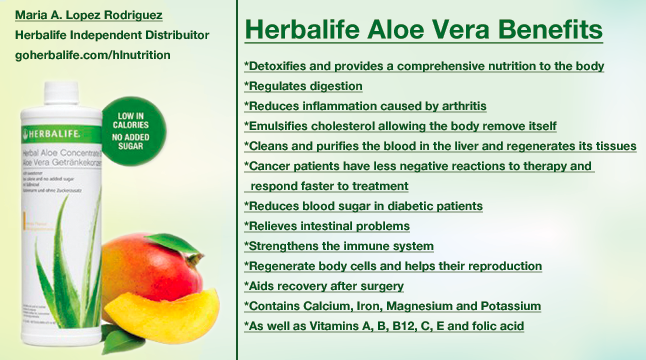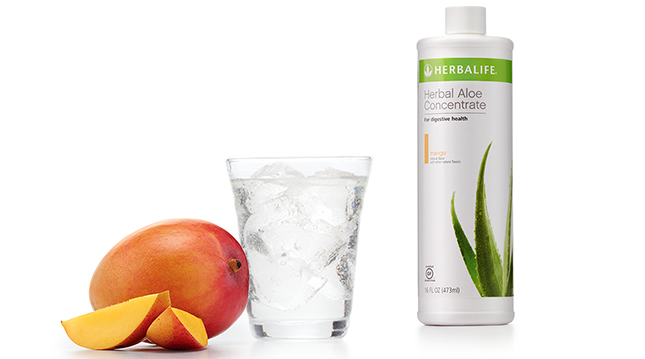Most people had home remedies that their parents and grandparents swore by growing up. Aloe vera is one such common home remedy, and you’d be hard-pressed to find a house without an aloe plant in it today. Slathered on sunburns, aloe vera speeds up the healing process, cools burnt skin, and quenches chapping. When used in hair care, you can expect plumper tresses and less comparative damage. Cultures both past and present have also used aloe as a digestive aid, something which is now catching on as a health trend in Western society.
Herbalife Nutrition is committed to consistently updating its catalog to showcase the best natural health products on the market. Herbal Aloe is one such product, designed to elevate and showcase the health benefits of aloe vera. Utilizing high-quality aloe, Herbal Aloe provides all the benefits of natural aloe vera without the potentially harmful side effects. The result is a delicious, easily-blended product that promotes hydration, gut health, and so much more.
Aloe Vera Is Not Just A Fad
Aloe vera is a succulent originally from the Arabian Peninsula, and widespread across much of Africa and the Mediterranean. It is one species of the aloe plant, with many other species found worldwide. Aloe’s health properties were known as early as 1350 B.C.E and were used initially as skincare by Egyptian royalty. That early knowledge of skincare properties led to several topical usages throughout history. Some of its most common usages include:

- Wound Care: aloe vera used as a moisturizer aids in wound healing by retaining moisture and improving skin elasticity. It is both hydrating and soothing, which can provide significant relief for those with wounds.
- Psoriasis: aloe vera effectively reacts to and helps reduce swelling in wounds and skin conditions, such as psoriasis. Additionally, its cooling nature and moisture-retaining properties ease the symptoms of psoriasis.
- Acne: aloe vera will not completely rid the skin of acne. However, it may help prevent scarring when used on healing ulcerative acne because of its skin-tightening properties. It must be used alongside a formal acne treatment to be effective
- Sunburn: aloe vera is beneficial for sunburns, helping them retain moisture, prevent and help heal blisters, and keep the skin cool as it heals.
It wasn’t just topical solutions that early aloe vera fans used, however. Aloe also was used as a constipation fix, or laxative, as early as the 1800s. Unprocessed aloe vera contains aloins and latex, which are the components that act as a laxative when consumed in large amounts. For a long time, aloe vera was used almost entirely topically or as a laxative. Today you can find it in most moisturizing skincare products, soaps, and shampoos. However, people have started incorporating filtered and processed aloe vera gel into food in recent history, and the results have been extraordinary.
What Are The Benefits Of Using Aloe Vera?
Modern people regularly use aloe vera for skincare. Some of the most common uses of aloe vera for skin care include:
- Antimicrobial uses
- Anti-inflammatory uses
- Acne prevention and reduction
- Moisturization
- Skin tone and elasticity improvement
- Cooling properties and anti-burn properties
- Providing vitamins and minerals to the skin
- Preventing and subduing skin flare-ups, such as eczema
Most people already understand the topical properties of aloe. However, it is also possible to safely consume it after processing. Processing aloe so that it is edible is somewhat time-consuming. But the juice that remains after processing provides several benefits. The gel within the aloe leaf is mainly made of water, which means that consuming processed gel can increase water intake. Aloe juice also supports digestive health. Early processing used aloe juice as a tonic to relieve upset stomachs, and there is reason to believe the thinking behind this is sound. It provides water and nutrients and retains many of the same cooling properties as unprocessed gels as you might use on a sunburn.
Aloe vera gel also contains polysaccharides – a simple sugar that provides energy to the body. Sports drinks like Gatorade use simple sugars to boost energy and support water retention, much in the same way that aloe juice and Herbal Aloe might. Unfortunately, sports drinks also contain needless calories. Aloe vera juice does not contain any excess calories and may also support immune response. This means recovering from illnesses and injuries may be enhanced when a person drinks aloe very juice. Additionally, aloe vera includes antioxidants that help the body recover from free radicals introduced to the body.
Most importantly, drinking aloe vera juice supports healthy digestion. Digestion is one of the most essential processes that occur within the body. It separates nutrients and waste from the food we ingest, and healthy digestion is key to a well-functioning body.
What’s key to a healthy digestive system? Water intake. Even when we aren’t drinking water, we are still intaking water via vegetables and fruits. But adding hydration into the equation leads to better digestion because digestion heavily relies upon water.
First, a person breaks down food within their mouths using their teeth and saliva. A less-hydrated person may have less saliva to work with and greater hunger, leading to larger pieces of food being swallowed. Next, your stomach breaks down food using internal acids. Again, hydration matters at this stage. If your stomach is trying too hard to process food, it will likely make noises, hurt, and produce flatulence. Then it goes through your intestines and finally is excreted. At every step of the process, water is a crucial element. Without it, you cannot properly digest, absorb nutrients, or rid the body of waste. Water and healthy hydrating products, like Herbalife’s Herbal Aloe, help with this.
Herbalife Reviews: Herbal Aloe
Herbalife created Herbal Aloe intending to get people hydrated without introducing them to the potentially harmful side-effects of raw aloe vera. It also was created to combat an issue many modern people face – healthy hydration. The idea of plain water isn’t appealing to everyone. However, the sugar-saturated shelves of soft drinks are not an appropriate healthy choice for hydration, either.
The United States is a huge culprit when it comes to consuming sugary soft drinks. Recently, United States respondents to a multi-nation survey about soft drinks indicated that as many as 28% drink soft drinks every day. This is less than the United Kingdom and far less than Germany, which had only 14% of its respondents admit to drinking soft drinks daily.
Herbal Aloe concentrate is explicitly designed for those looking to reap the benefits of hydration and aloe vera without the side effects of sugary drinks and unprocessed aloe vera. The drink mix comes in several flavors, including mandarin orange, mango, grape, cranberry, and original. When used as directed, the drink mix may:
- Support a healthy digestive process
- Support intestinal health and the absorption of nutrients
- Relieve mild, temporary indigestion (you should discuss any chronic or recurring indigestion with a doctor)
- Provide relief to upset stomachs
Although it does not look like the original product, Herbal Aloe offers the same benefits as freshly processed aloe vera juice. It also tastes great, and Herbalife reviews show that its versatility is beloved by those who use it regularly. To use Herbal Aloe, simply:
- Pour three capfuls of Herbal Aloe into a cup
- Mix with 4 ounces of water
- Drink and enjoy!
Herbal Aloe may also be used with tea, freshly-squeezed juice, coffee, or other Herbalife Nutrition drink products. However, most opt to drink the mix with water for a refreshing drink.

Why Not Just Drink Fresh Aloe?
When people take the time to consider their health, they often try to do whatever they can to make sure they give themselves the best. A popular thing for those seeking healthy lifestyles to do is to try and mitigate heavily processed foods. However, aloe is one of those foods that is most healthy when it does go through processing. Without the processing process, drinking raw aloe may have more negatives than benefits.
Humans cannot eat aloe raw because it contains aloins, which work as a laxative in humans. Therefore, adding fresh aloe to drinks might do the opposite of what they were initially meant to do, dehydrating the body because of its laxative effects. To safely consume aloe, it must be processed to remove aloins. By doing this, the laxative components of the plant are taken out without compromising the vitamins and nutrients. Herbalife Nutrition goes above and beyond simply processing raw aloe. It ensures that the aloe it uses in its products is top quality from the beginning.
Herbalife Herbal Aloe drink mix removes aloins through a process called decolorization. First, Herbalife receives its aloe vera from trusted, seasoned Mexican aloe farmers. Each leaf is hand-picked and examined for quality. When it gets to the processing plant, leaves are washed, then sanitized, then juiced. The subsequent aloe juice is fed through a charcoal filter to remove the aloins. This charcoal filter is food-grade and safe for use in consumption processing.
From there, Herbalife Nutrition processes the clean, nutrient-dense juice into their product. They pass it through an additional filter to remove any stray skin or other impurities. Then, the product is filtered once more, pasteurized, and turned into a concentrate for consumption. In the hands of customers, the possibilities for the mix are endless.
It can be hard to parse which health products are best for you in a consumer-oriented world. It can be even harder to pick the right health drinks since many are marketed toward digestion and hydration. However, Herbalife Nutrition’s decades of devotion to product excellence – as well as their commitment to health – make Herbal Aloe an easy choice for anyone trying to step up their hydration game.
